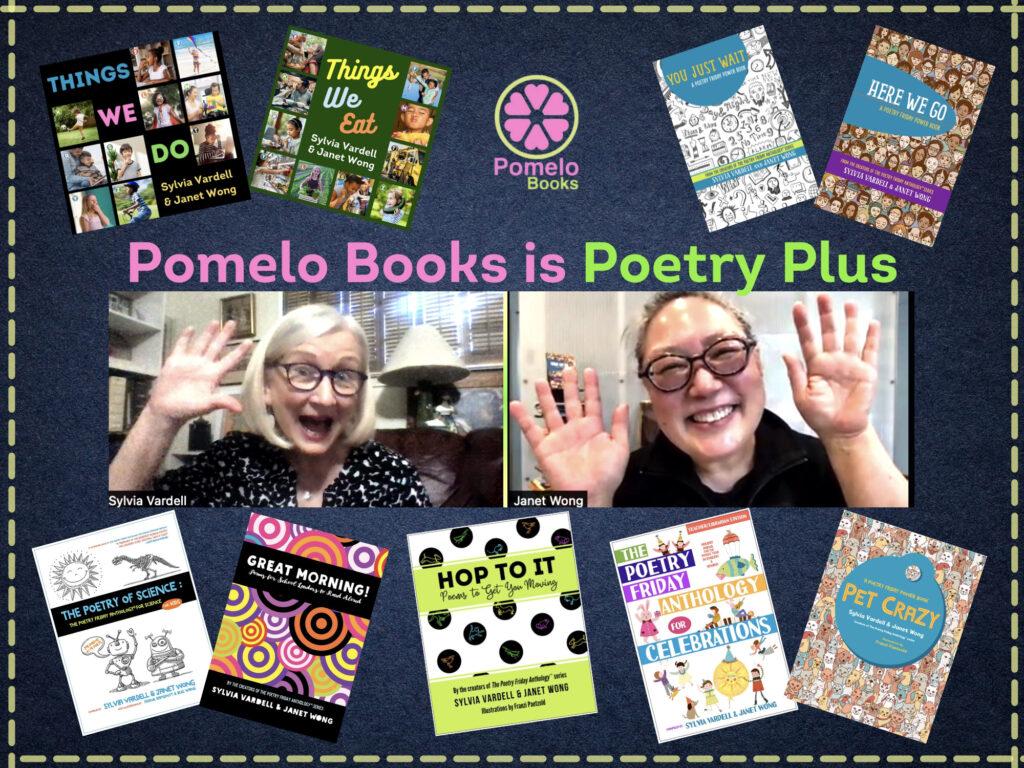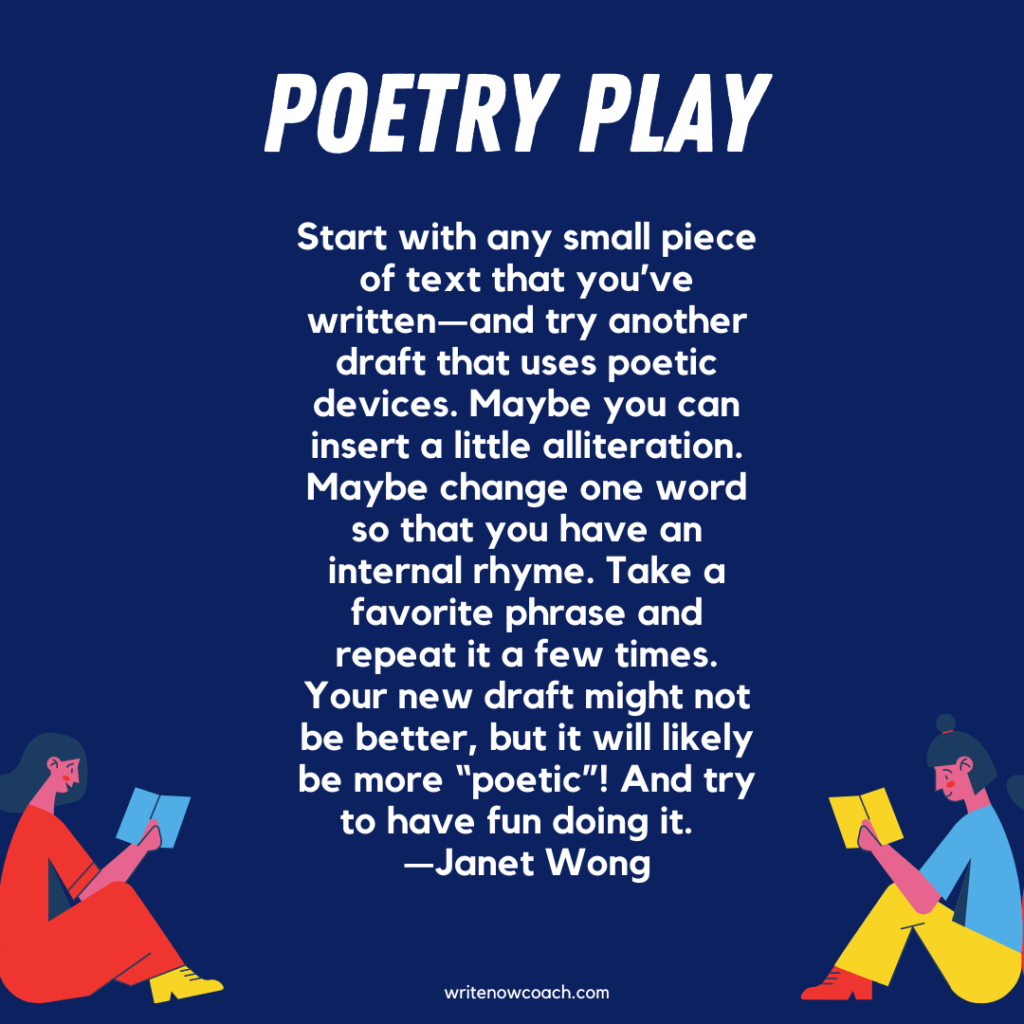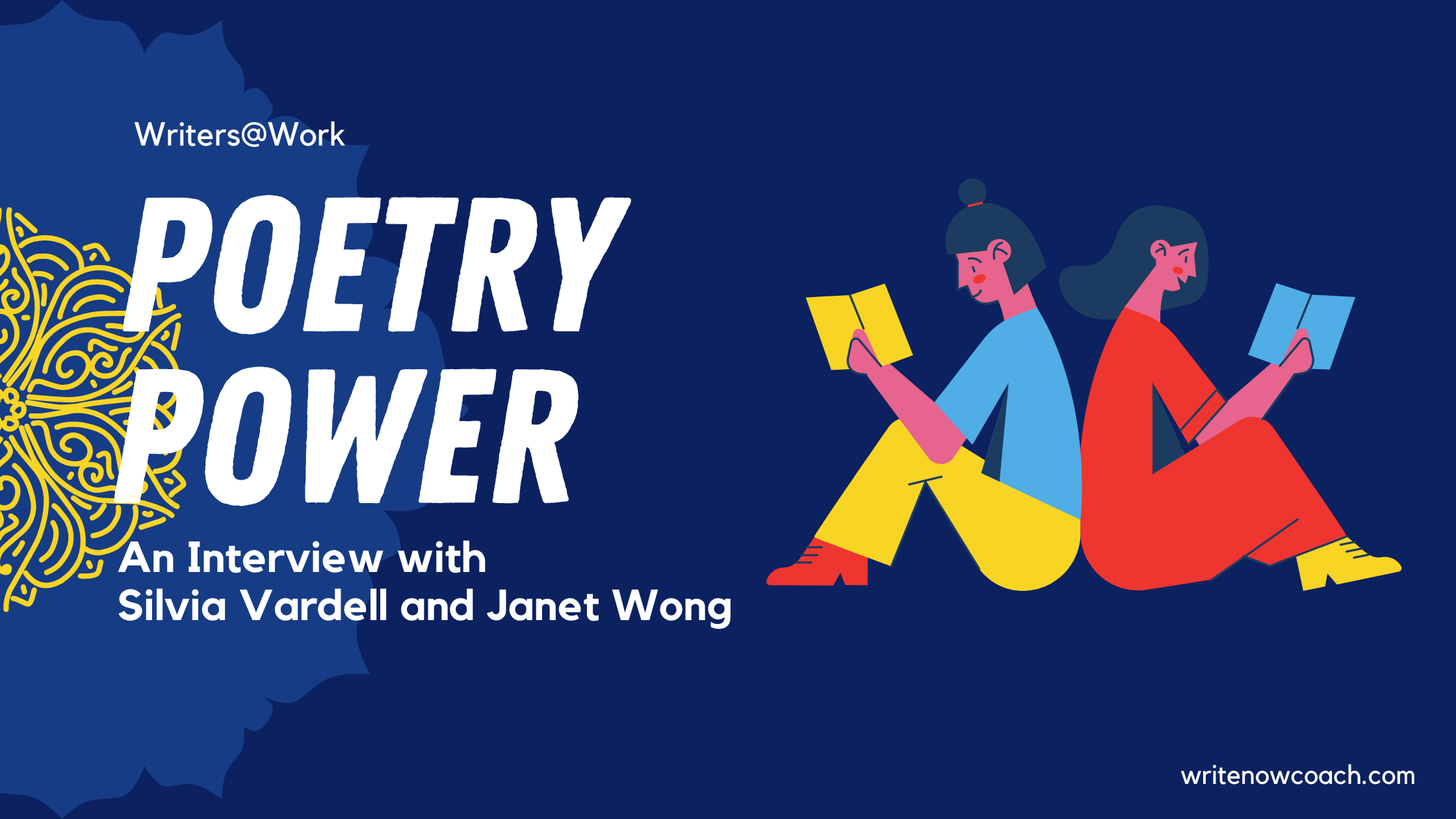Writers@Work: Poetry Power
April 5, 2022
Note From Rochelle
Dear Writers,
Since before I founded Dream Keepers in 2005, I’ve been reading and writing poetry with young people. But the pandemic curtailed my opportunities to teach writing. Oh, how I’ve missed it. Not just reading poetry. Or writing it. But watching young people hear poetry and get that it can convey hope or hilarity or both. Something shifts for them. They stop thinking poetry isn’t just words about LOVE grown-ups write on Valentine’s Day cards. Now it’s something cool that they might want to write.
Thankfully, the invitations started showing up again—and I hope I’ll be back teaching before too long. If you, your classroom, or library is interested in having me speak about writing, lead a poetry workshop, or talk about my new book, contact me.
A few months ago, I took one of the workshops Pomelo Books offers—and wow! I knew I had to interview Sylvia Vardell and Janet Wong for the newsletter. Read on to learn about their publishing house and how you can use poetry in your daily writing.
Happy writing,
Rochelle, the Write Now! Coach
Writers@Work: Poetry Power!
An Interview with
Sylvia Vardell and Janet Wong

RYM: Welcome to the blog! Can you tell us about your company, Pomelo Books, and the work you do?
JW: Our motto is “Pomelo Books is Poetry PLUS!” We aim to make it easy for teachers, librarians, and families to share poetry—and we want kids to get something “extra” with the poems. Maybe they’ll learn STEM vocabulary with The Poetry Friday Anthology for Science or they can have a fun “brain break” while jumping and stretching to the poems in HOP TO IT: Poems to Get You Moving. There are so many terrific poetry collections and anthologies; we’re trying to offer poems plus some bonus content.
SV: Yes, we love infusing “extra” elements in each of our books, from facts related to poems to teaching tips for classroom instruction. Each of our anthologies offers these kinds of elements for the young reader as well as for the adult who buys and shares our books with children. One of my favorite elements is a “did you know” component of fun and fascinating facts that we infuse into mini-lesson discussion points (in our science and celebration anthologies) and in introductory openings in Great Morning: Poems for School Leaders to Read Aloud and in Hop to It: Poems to Get You Moving.
RYM: I know you publish some amazing anthologies. What are some of the current anthologies and collections you recommend people read for inspiration?
SV: We love celebrating the work of many poets, especially new voices and diverse voices. I really love You Don’t Have to Be Everything: Poems for Girls Becoming Themselves edited by Diana Whitney. It mixes classic poems with new, contemporary poems all combined in a visually rich and interesting layout. It’s very browsable and perfect for young readers (ages 12 and up) exploring what it means to be female.
JW: She’s too modest to recommend it, but I think the best poetry book to start with is A World Full of Poems, the book of one hundred poems that Sylvia compiled for DK. Most of the poetry books that we find in the United States feature only American poets, but this book includes poets from all over the world. Sylvia is quite influential in the world of international children’s poetry, and this book is evidence of that.
RYM: If our readers want to start writing poetry or incorporating poetic language into their writing, how do you recommend they do that?
JW: Start with any small piece of text that you’ve written—a birthday note or part of a picture book manuscript or an email—and try another draft that uses some poetic devices. Maybe you can insert a little alliteration for fun. Maybe change one word so that you have an internal rhyme. Take a favorite phrase and repeat it a few times. Your new draft might not be better, but it will likely be more “poetic”! And try to have fun doing it. While novelists might focus most of their revision efforts on character or plot, poets can easily devote hours just to playing with words.

RYM: You also teach amazing classes on publishing poetry. Can you talk about Anthologies 101, 201 and more?
SV: Janet and I have been collaborating for a decade now (which seems amazing) and we’ve learned so much with every book we’ve produced, all the poets we’ve worked with, and every bit of technology we’ve tried. We thought it might be helpful to others in the poetry community to share some practical tips and insights, so we’ve launched this new series of workshops—and it’s been so fun and meaningful. With Anthologies 101, we give participants the “lay of the land” when it comes to poetry anthologies getting published today. In Anthologies 201, we actually publish a collaborative poetry anthology for children ages 3-8 and participants get mentor feedback on their poem drafts and guidance through video tutorials on creating and publishing an anthology. In Anthologies 301, we offer fun, interactive workshops where we create digital visuals for poems, make poem videos together, and create swag—physical poetry-themed items like bookmarks, buttons, and more. We’re launching Anthologies 401 soon with an opportunity to collaborate on another poetry anthology—this time for middle grade readers.
JW: Yes to all of that; and there’s even more info in this short piece that we wrote for Sylvia’s blog.
RYM: You two do so much—between running a company, editing other writer’s work, teaching in schools, and all that—what strategies do you use to find time to write?
JW: Sylvia is the busiest person I know. If she has an hour of free time, she will fill it; if not with work, with volunteering or watching a movie or listening to an audiobook or sewing or making “swag.” My time-finding strategy is to ask Sylvia to do 90% of our work!
SV: Janet is too modest—she is always busy, often brainstorming new projects for us to consider! We feed off of each other’s energy as well as keep the other person accountable for the next task. Is it weird that we find work so much fun?
RM: What are you reading now?
JW: There are troubling things in the news, and it’s not easy (or enjoyable) to keep up with current events. But we all need to keep on educating ourselves, and so I’ve been trying to learn more about Ukraine. Most of my reading on this topic has been online. I think we discount non-book reading too readily; we need to honor the reading that kids do when they’re looking for information or entertaining themselves on the internet. But I also want to have some light and happy books on my desk. Two current favorites are The Crab Ballet by Renée M. LaTulippe and If This Bird Had Pockets by Amy Ludwig VanDerwater. Each of these books is full of mastery of our poetic craft—and JOY! If these books were foods, they would be angel cake with raspberries and fresh whipped cream.
SV: I just finished Ruta Sepetys’s new novel, I Must Betray You about the fall of Communism in Romania in 1989 and the courage of young people during that uprising. So powerful—especially in this moment in history. And I just got an advance reader copy (ARC) of Kwame Alexander’s new novel in verse, The Door of No Return, the first in a new trilogy, which I am so excited to read!
RYM: Thank you to both Sylvia and Janet for being here and sharing their wisdom. Readers, look around. You will find poetry everywhere: in books and television shows, on billboards and in magazines, in song lyrics and persona texts from friends. And, of course, in Sylvia and Janet’s books. Treat yourself to a new poetry book this month!
About the authors
Sylvia Vardell is Professor in the School of Library and Information Studies at Texas Woman’s University; her current work focuses on poetry for children, including the nationally recognized blog, Poetry for Children.
Janet Wong is the author of 37 books for children and teens on a wide variety of subjects, including race (Good Luck Gold & MORE). You can learn more about their newest books Things We Do and Things We Eat at the Pomelo Books website.









